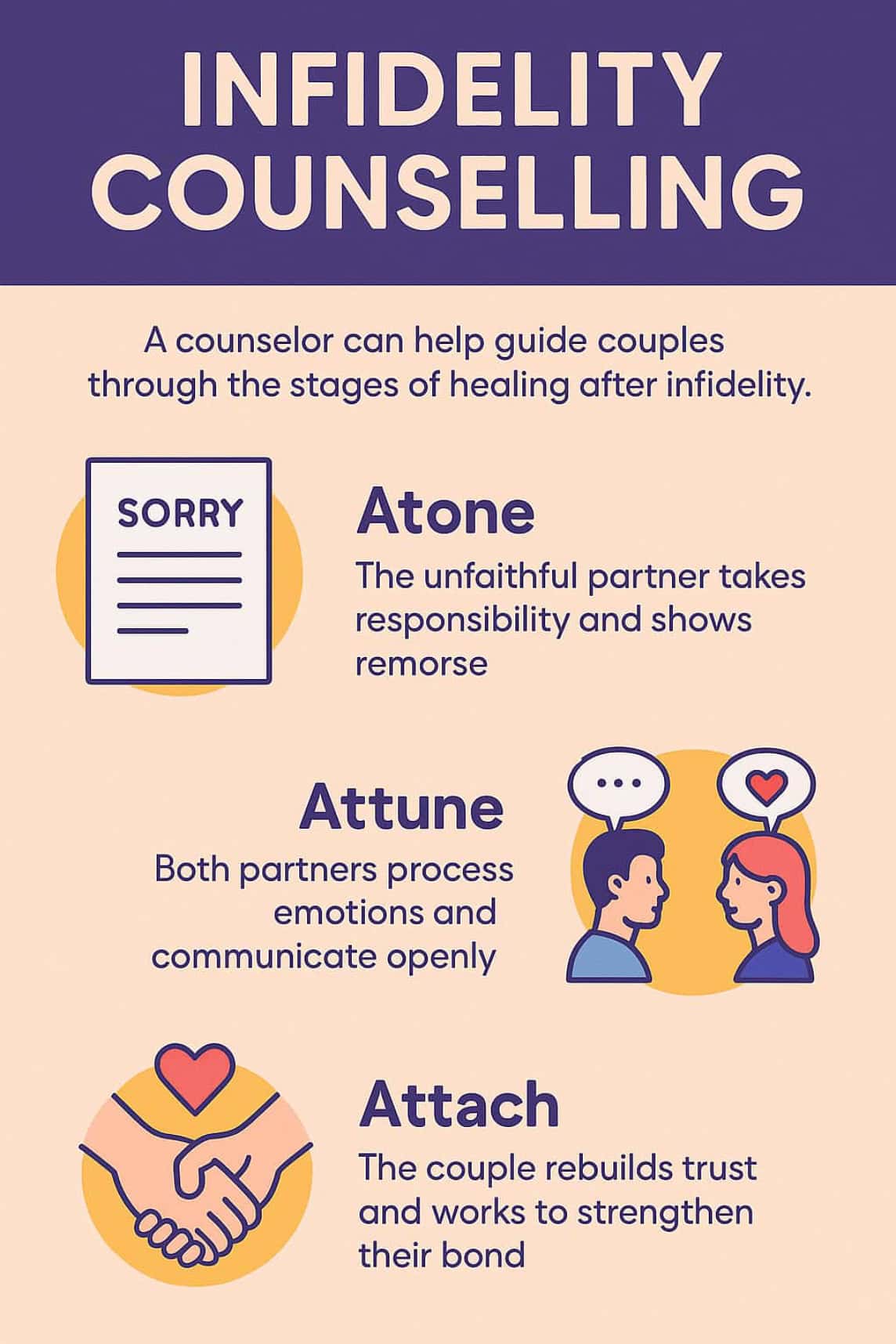
Why Infidelity Hurts So Deeply.
- Betrayal equals trauma. Brain scans show affair discovery activates the same regions as physical pain.
- Common but isolating. The Institue for Family Studies found that roughly 20% of married men and 13% of married women admit to cheating.
- Divorce risk is real. According to Psychology Today, unfidelity is named in 57% of break-ups.
Early professional help slows panic, protects mental health, and sets the stage for repair.

The Gottman Trust Revival Method in Plain Language.
The model unfolds in three stages: Atone → Attune → Attach
Think of it as cleaning a wound, knitting skin, then regaining full movement.
Stage: Atone.
Goal: Stop the bleeding and show honest remorse.
Time Focus: Days-Weeks
Stage: Attune.
Goal: Rebuild emotional safety and mutual understanding.
Time Focus: Weeks-Months
Stage: Attach.
Goal: Create a new bond with rituals, intimacy, and shared dreams.
Time Focus: Months-Year
A trained Gottman counsellor guides every conversation, keeps blame balanced, and tracks progress with structured tools.
Stage One – Atone: Stop the Bleeding.
Key Elements:
- Full disclosure. The involved partner shares a factual timeline, no trickle truth.
- Zero contact with the affair partner. Block numbers; write a decisive goodbye letter if needed.
- Transparency rules. Share phone, social, and bank access for a set time frame.
- Empathy in action. The hurt partner asks any question, the involved partner listens and answers without defensiveness.
- Safety plan. Both partners sleep, eat, and exercise to stabilise bodies flooded with cortisol.
Practical To-Dos:
- Use a “24-hour honesty” rule: any new detail surfaces within one day.
- Schedule two short check-ins daily, stick to facts, not analysis.
Counsellor’s Role:
A certified Gottman therapist creates a safe room, moderates disclosure, and normalises trauma responses so neither partner feels “crazy.”
Stage Two – Attune: Rebuild Emotional Safety.
Key Elements:
- Open-ended questions. “What hurts most right now?” invites depth.
- Stress-reducing conversation. Ten minutes each night on non-relationship stressors.
- Validating statements. “Your feelings make sense to me” lowers heart rates.
- Love Map update. Partners learn current hopes, fears, and favoured comforts.
- Repair attempts. Gentle humour, an apology, or a soothing touch to reset rising anger.
Practical To-Dos:
- Try the “ATTUNE” acronym during talks: Awareness, Turning toward, Tolerance, Understanding, Non-defensive, Empathy .
- Keep conflict under 20 minutes; take a 20-minute break if flooded.
Counsellor’s Role:
Your therapist coaches active listening, uses biofeedback to spot flooding, and assigns at-home exercises such as journalling feelings before each check-in.
Stage Three – Attach: Build a Stronger Bond.
Key Elements:
- Rituals of connection. E.g., morning hugs, Sunday planning sessions.
- Shared meaning. Define family values, spiritual practices, or long-term goals.
- Gradual physical intimacy. Start with safe touch lists, progress at the hurt partner’s pace.
- Future-focused language. “When we retire, we will…” signals renewed commitment.
Practical To-Dos:
- Plan a weekly “State-of-Us” meeting: celebrate wins, tackle challenges, schedule fun.
- Create a joint vision board of trips, projects, and couple dreams.
Counsellor’s Role:
The therapist models affectionate dialogue, tracks ratio of positive to negative interactions (aim for 5:1), and introduces sensate-focus or other gentle exercises to reignite desire.
When to Seek Professional Infidelity Counselling.
The “You and I” approach can handle much, yet expert help speeds healing when:
- Flashbacks, panic, or intrusive thoughts last over four weeks.
- Angry exchanges become personal attacks.
- The involved partner stays defensive or minimises.
- You try DIY steps but feel stuck.
Research shows couples who finish structured affair recovery report higher relationship satisfaction than before the betrayal

Next Steps.
Healing is a marathon, not a sprint. Still, with clear stages: Atone, Attune, Attach, and guided infidelity counselling, many couples move from heartbreak to a deeper, more secure love.
Book your 15-minute complimentary phone consultation and let’s start your personalised roadmap today.

